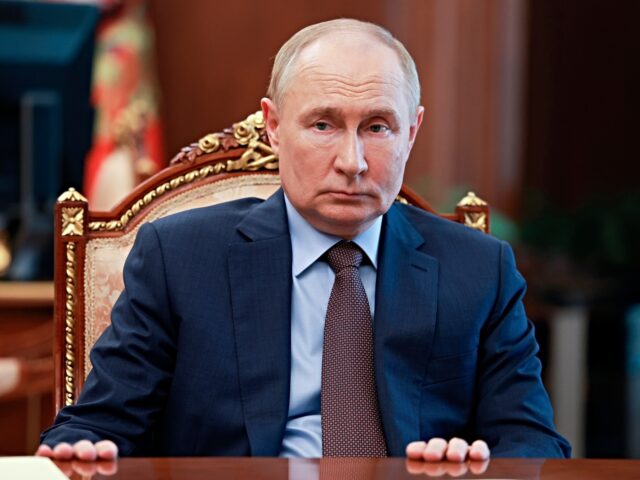The Kremlin responded to comments by Ukrainian Foreign Minister Dmytro Kuleba in which he claimed Kyiv is “willing and ready” to dialogue with Russia, stating on Thursday that the regime was “generally open” to negotiation.
Kuleba reportedly made the comments during an ongoing visit to Beijing, China, in conversation with Chinese Foreign Minister Wang Yi. Both the Chinese Foreign Ministry and Ukrainian state media reported that he stated the administration of President Volodymyr Zelensky was “willing and ready” for dialogue regarding Russia’s ongoing invasion of Ukraine. No reports suggested and details as to what, exactly, Zelensky would like on the agenda to discuss or whether Ukrainians officials believe the invasion can be ended through dialogue or not.
“Ukraine is willing and ready to have dialogue and negotiation with Russia,” Kuleba reportedly said. “And of course, negotiations should be rational, substantive and aimed at achieving just and lasting peace.”
In the only statements Kuleba himself published following the Beijing talks, reproduced on his social media accounts, the foreign minister said that, in speaking with Chinese communist officials, “I emphasized that Ukraine needs a just and lasting peace, not just an illusion of peace, and I appreciate that this position was reciprocated.”
Regardless of the lack of detail in Kuleba’s comments – which Kremlin spokesman Dmitry Peskov emphasized – the remarks from Ukraine’s top diplomat represented a dramatic change in rhetoric out of Kyiv, which has insisted that Ukraine has nothing to discuss with Russia until the Russian military pulls all of its troops out of all sovereign Ukrainian territory.
Russia has spent over a decade attempting to colonize substantial parts of Ukrainian territory. Strongman Vladimir Putin invaded and “annexed” Ukraine’s Crimean peninsula in 2014 and has since “annexed” four other territories: the Donbass regions of Donetsk and Luhansk, Kherson, and Zaporizhzhia. Russian officials have repeatedly stated that any end to the ongoing full-scale invasion, which began in February 2022, would require Ukraine to give up the colonized territories.
Peskov’s comments on Thursday, while claiming Russia is “open” to talks, suggested Moscow would only negotiate if it felt that the talks would help it secure its stranglehold on the occupied territories, among other demands.
“Russia is generally open to the negotiation process, but we first need to understand if the Ukrainian side is ready,” Peskov said, according to the Moscow Times. “From a practical point of view, we’re open to achieving our goals through negotiations.”
Peskov did not elaborate on which “goals” the Russian government would be open to pursuing in talks.
The spokesman also recalled that Zelensky used a decree to formally declare any negotiations with Russia “impossible” so long as Putin remained in power, citing the decree as an obstacle to such talks. The decree was signed in October 2022, eight months into the full-scale invasion.
“In addition to the general problem with Zelensky’s legitimacy, there’s also a problem with the actual legal prohibition of any contacts and negotiations with the Russian side,” Peskov said. “So there’s still a lot to be clarified here.”
Zelensky’s presidential term legally ended on May 20, but Ukrainian authorities have extended it on the grounds that holding a free and fair election in the war-torn state is currently unrealistic.
The Russian news agency Tass reported on Wednesday that Peskov’s initial response to the Kuleba comments were to declare that it was “too early to talk about any detail,” suggesting, “it would be nice to obtain explanations from an official representative” of the Ukrainian government directly.
Putin and Zelensky last held direct talks in 2019, which Zelensky described as frustrating and unproductive at the time.
“Look, it’s very difficult to negotiate [with Putin], but today there were moments when we agreed on something, on certain things,” Zelensky explained following the 2019 talks. “That’s because he dissects every question into details … and then we begin to even consider every word. … I’m just a different person, I’m a quick person. I thought that we could just sit down real quick and have a deal … But it’s different here.”
Putin, in turn, celebrated that encounter.
“In the end, I think, and we share this assessment, that this work was very useful,” Putin said.
Zelensky has refused direct talks with Putin since, even moreso after the 2022 invasion. In September 2022, Zelensky said it was “clear and obvious” Ukraine would not have talks with the Putin regime, opening up to talks only if Putin fell from power. Putin “annexed” the Donbass, Kherson, and Zaporizhzhia that month.
He also signed a decree effectively outlawing dialogue with Putin’s Russia shortly thereafter.
The sudden interest in dialogue from Ukraine followed a phone call between Zelensky and former American President Donald Trump this weekend, which both sides described as positive.
“Ukraine will always be grateful to the United States for its help in strengthening our ability to resist Russian terror. Russian attacks on our cities and villages continue every day,” Zelensky said in a statement on social media. “We agreed with President Trump to discuss at a personal meeting what steps can make peace fair and truly lasting.”
Follow Frances Martel on Facebook and Twitter.

COMMENTS
Please let us know if you're having issues with commenting.